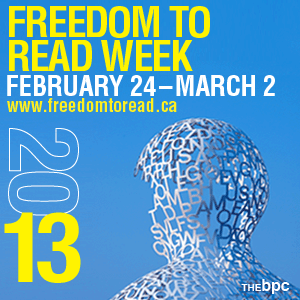
When you can find ‘Fifty Shades of Grey’ readily available at your local grocery or drugstore, do we even need to worry about the Freedom to Read anymore?
Yes.
In the United States, every September, a week is set aside to celebrate the freedom to read. This year Banned Books Week will run from September 22-28th. Banned Books Week is sponsored by the American Booksellers Association; American Booksellers Foundation for Free Expression; the American Library Association; American Society of Journalists and Authors; Association of American Publishers; Comic Book Legal Defense Fund; the Freedom to Read Foundation; National Coalition Against Censorship; National Council of Teachers of English; National Association of College Stores; PEN American Center and and Project Censored. It is endorsed by the Center for the Book in the Library of Congress.
In Canada, we celebrate Freedom to Read Week and this year it runs from February 24th to March 2, 2013. The event is sponsored by The Freedom of Expression Committee of Canada’s Book and Periodical Council, "the Umbrella Organization for Writing and Publishing in Canada." At the moment, there are two librarians on this committee from the Canadian Library Association:: Jane Pyper, Toronto City Librarian and Alvin Schrader, a Professor at the School of Library and Information Studies, University of Alberta.
The Freedom of Expression Committee has a Position Statement on the Freedom of Expression and the Freedom to Read. The Canadian Library Association has a Position Statement on Intellectual Freedom. Both are prefaced with a reference to the Canadian Charter of Rights and Freedoms which states, as Fundamental Freedoms...
Everyone has the following fundamental freedoms:
- freedom of conscience and religion;
- freedom of thought, belief, opinion and expression, including freedom of the press and other media of communication;
- freedom of peaceful assembly; and
- freedom of association.
What’s interesting to me are the differences in the choice of language between these two position statements.
The first paragraph of The Canadian Library Association’s Policy statement on Intellectual Freedom is framed around every Canadian’s fundamental right to intellectual freedom. What follows is a brief outline of the responsibilities of librarians in support of these rights:
Libraries have a basic responsibility for the development and maintenance of intellectual freedom.
It is the responsibility of libraries to guarantee and facilitate access to all expressions of knowledge and intellectual activity, including those which some elements of society may consider to be unconventional, unpopular or unacceptable. To this end, libraries shall acquire and make available the widest variety of materials.
The first paragraph of The Book and Periodical Council’s position statement, on the other hand, is framed against the suppression of writing and the silencing of writers. But what I find very interesting is the their deference to the courts alone in the second paragraph on who decides our right to read.
The freedom to choose what we read does not, however, include the freedom to choose for others. We accept that courts alone have the authority to restrict reading material, a prerogative that cannot be delegated or appropriated. Prior restraint demeans individual responsibility; it is anathema to freedom and democracy.
I find this language quite interesting because at the moment, there is very important story that is still unfolding of a publisher who is using the Ontario Court System to suppress a librarian's freedom of expression. Edwin Mellen Press has filed two suits for libel and damages of over $4 million against Dale Askey, a librarian, for expressing his professional opinion about the quality of Edwin Mellen publications, as well as his current employer, McMaster University.
It could be said that the press in question is employing what is known as the chilling effect...
In a legal context, a chilling effect is the inhibition or discouragement of the legitimate exercise of a constitutional right by the threat of legal sanction. The right that is most often described as being suppressed by a chilling effect is the right to free speech [Wikipedia]
This is also known as libel chill. As Brian MacLeod Rogers, a media lawyer lawyer who specializing in libel, privacy, and copyright tells PEN Canada National Affairs Chair, Philip Slayton, "I see libel law ... as a sort of invisible hand of censorship that we don't often see."
The University of Windsor's Faculy Association has joined many others demanding the Edwin Mellen Press drop their lawsuit in a statement (The Windsor University Faculty Association supports CLA position on Mellen Press suit against McMaster librarian [pdf]). If you would like to lend your support, you can sign this petition on Change.org to urge them to do the same.
There's no better way to celebrate your Freedom to Read than to defend our rights to do so.

Connect with your library